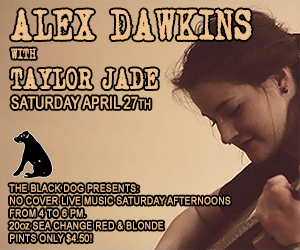WHO NAMED THE BAND: Christian Hansen inspired by people with autism
Posted on March 29, 2012 By Mike Ross Front Slider, Music
 You can read a lot into a good band name, especially when there’s a good story behind it. Take, for example, Christian Hansen – who simply would not have had the courage to name his band Christian Hansen and the Autistics if he hadn’t been teaching music to actual autistic people. Wrap your head around that.
You can read a lot into a good band name, especially when there’s a good story behind it. Take, for example, Christian Hansen – who simply would not have had the courage to name his band Christian Hansen and the Autistics if he hadn’t been teaching music to actual autistic people. Wrap your head around that.
In fact, this band would not be where it is today – a hit song on its hands (Cocaine Trade, see video below), in the vanguard of the “dance-rock” movement, big move from Edmonton to Toronto with wife and bandmate Molly Flood, returning triumphantly to play the Dinwoodie Lounge Friday night with new album on the way – if it weren’t for the lessons the singer learned from a pair of his allegedly “disabled” students.
 “I was very inspired by their lack of fear in approaching music,” he says. “I just kind of had a lightbulb moment: This is how I have to approach creating music myself – and this is how I have to approach live performance. No. 1 was to stop worrying what everyone thought. Stop worrying about where you’re going to fit into the music scene, stop worrying what other musicians are going to think of you, stop worrying what people are going to think of the songs.”
“I was very inspired by their lack of fear in approaching music,” he says. “I just kind of had a lightbulb moment: This is how I have to approach creating music myself – and this is how I have to approach live performance. No. 1 was to stop worrying what everyone thought. Stop worrying about where you’re going to fit into the music scene, stop worrying what other musicians are going to think of you, stop worrying what people are going to think of the songs.”
In short, stop worrying. Autistic people have trouble figuring out what other people are thinking anyway, which isn’t a bad thing for a fearless artist wanting to be original. During his experience working at Chrysalis, an Edmonton based arts and education centre for people with disabilities, Hansen learned all about the challenges of autism – along with some of the gifts it can bestow.
“While it is a challenging state of existence for them and everyone around them, their friends and families, there’s an intrinsic set of strengths that come with that, how they see the world, their approach – and there’s a lot we can learn from that,” he says.
It’s not hard to find examples of successful autistic adults. The most famous may be animal science professor Temple Grandin, who invented a device for calming cattle that also happened to work to soothe autistic humans. She was written up in Time magazine and in books by Oliver Sacks. It’s also not hard to find an example of how social media has helped autistic people communicate. The Internet seems to have put everyone in the same boat.
That’s a lot of weight in one band name. It came to Hansen in a flash, he recalls, and was so perfect it couldn’t be refused. This happened to coincide with a period in his life where he was making a brave musical change from basic acoustic guitar songs in a basic band setting to playing with synthesizers and electronic rock, eventually shedding the guitar almost entirely to reportedly good effect. The band took off shortly thereafter, ‘07 or so.
Hansen says most of the reaction to the name has been positive. There was a promoter in Vancouver who once who refused to book the band, saying its name was “more offensive than the Fetal Abortions.” Recently, Hansen says, a musician in Toronto remarked that such a name “may have worked out West, but here in Toronto people are going to be offended.”
It has yet to be seen to any great extent. Toronto’s going swell so far, Hansen reports. They got a gig in the first week and a half, played Canadian Music Week, have Toronto shows lined up after this tour. Hansen says that the people most offended by the band name are “the ones furthest away from autism,” and that their reactions reveal their prejudice.
“It’s people who feel they should be offended because they make the assumption that the word is pejorative,” he says. “It’s revealing about their attitudes towards people with disabilities.”
Band name-wise, “It’s also about judgements we put on people without knowing the full story – just like the judgements we put on people with autism. We assume it’s a handicap, that it’s negative, but in reality there’s a bigger story happening here and they possess skills, talents, abilities that are amazing if we would take the time to just go investigate a little bit further, to spend the time to get the whole story.”
The name works on so many levels. It can be applied to the band’s sunny, dance-poppy vibe contrasting with the dark lyrics, as in Cocaine Trade: “I used to dance. I thought the music was sweet. It was just ‘cause the drugs matched the beats.” Moreover, the lessons of fearlessness the singer learned can be applied to the business of music. It’s all about the songs, it’s all about the fans, and it has to be real.
“We have to be who we are,” Hansen says. “There’s people at every single juncture who will say that you’re not doing this right, that you have to change this, that you have to change your name, that you have to go more dance or more rock, more of this, more of that, until you can reach the point where you’re letting everyone influence you so much because you want success that at the end you have nothing, and you have this middle of the road thing that says nothing.”
Hansen, a theatre grad whose parents worked with disabled people, says the Autistics’ next album is due to come out in September. Expect yet a different direction, he says. Its title: Dance Floor Death Core.
The best album and song titles, like the best band names, Hansen says, have to be “provocative.”
Mission accomplished.













